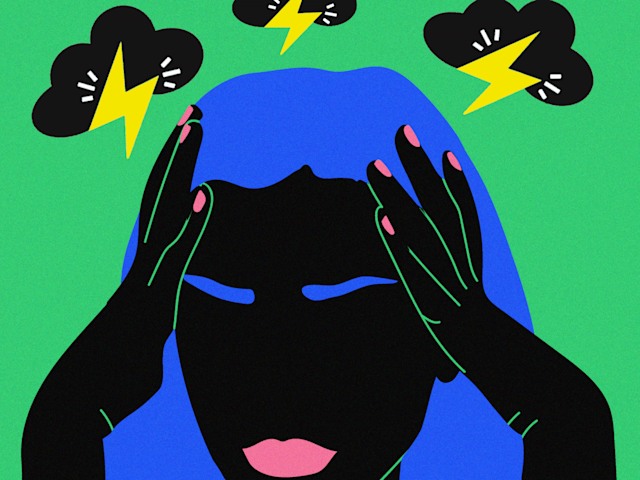If you are a woman who has been recently diagnosed with ADHD, or if you have been struggling with ADHD symptoms for some time now, you may be feeling overwhelmed and confused. What does this diagnosis mean for you? What treatments are available? And what is the best way to manage ADHD in women? This comprehensive guide will answer all of your questions and provide you with the information you need to make the best decisions for your life.
Contents
What Is ADHD In Women?
 ADHD in women is a condition that is characterized by problems with focus, hyperactivity, and impulsiveness. It is estimated that ADHD affects around five percent of women in the United States. The symptoms of ADHD can vary from woman to woman, and they can also change over time.
ADHD in women is a condition that is characterized by problems with focus, hyperactivity, and impulsiveness. It is estimated that ADHD affects around five percent of women in the United States. The symptoms of ADHD can vary from woman to woman, and they can also change over time.
If we look at ADHD alone, it is one of the most commonly diagnosed mental disorders in children. But it is only recently that we are beginning to understand how ADHD affects women differently than men. So there is no such thing as a “one size fits all” when it comes to ADHD treatment in women.
There are many factors that can contribute to the development of ADHD in women. These include genetic factors, brain structure, and exposure to toxins. There is also evidence that suggests that ADHD may be linked to hormonal changes during puberty and pregnancy.
Therefore, it is important to understand ADHD in women in order to provide the best possible treatment. And do not hesitate to see a mental health professional for an evaluation. They can help determine if the symptoms are due to ADHD or another condition.
Signs And Symptoms Of ADHD In Women
The signs and symptoms are not always the same for every woman, and they can vary depending on the person’s age and stage of life. However, there are some common symptoms that many women with ADHD experience.
Difficulty staying organized
One of the most common signs of ADHD in women is difficulty staying organized. This can manifest itself in a variety of ways, such as being late for appointments or forgetting to pay bills on time. Women with ADHD may also have trouble keeping track of their belongings, and their homes may be cluttered or disorganized. Also, it is not uncommon for women with ADHD to lose important papers or misplace their keys on a regular basis.
Procrastination
Another common symptom of ADHD in women is procrastination. This can be extremely frustrating for both the woman and her loved ones, as she may start projects but never finish them. For example, she may start cleaning out her closet but never actually get around to finishing the job. Or, she may start a work project but never complete it because she gets sidetracked easily.
Difficulty staying focused
 Many women with ADHD have difficulty staying focused on tasks, whether at home or at work. This can make it difficult to complete even simple tasks, such as laundry or grocery shopping. It can also make it hard to concentrate at work, which can lead to problems with productivity. Also, being focused is one of the first things to do when a woman with ADHD is feeling overwhelmed or stressed.
Many women with ADHD have difficulty staying focused on tasks, whether at home or at work. This can make it difficult to complete even simple tasks, such as laundry or grocery shopping. It can also make it hard to concentrate at work, which can lead to problems with productivity. Also, being focused is one of the first things to do when a woman with ADHD is feeling overwhelmed or stressed.
Restlessness
Another common symptom of ADHD in women is restlessness. This can manifest itself in a variety of ways, such as fidgeting or pacing when she’s trying to concentrate on something. It can also make it hard for her to sit still for long periods of time, which can be disruptive both at work and at home. However, restlessness is often misinterpreted as laziness, which can further compound the problem.
Poor time management skills
Women with ADHD often have poor time management skills, which can be a major source of stress in their lives. For example, they may have trouble getting to appointments on time or meeting deadlines at work. This can lead to a lot of missed opportunities and frustration. Because it is such a common symptom, it is often one of the first things that are addressed when treating ADHD in women.
Impulsivity
Another common symptom of ADHD in women is impulsivity. This can manifest itself in a variety of ways, such as impulsive spending, impulsive eating, or impulsive sex. It can also lead to risky behaviors, such as unprotected sex or driving without a license. Impulsivity can be a major source of stress in both her personal and professional life.
ADHD in women is often misunderstood and misdiagnosed. Because the symptoms can vary so widely from person to person, they can be difficult to spot. And because it’s often seen as a “male” disorder, many women go through their lives undiagnosed and untreated. If you think you may have ADHD, it’s important to see a qualified professional who can help you get the treatment you need.
How ADHD In Women Is Different From Men?
 It is believed that ADHD manifests itself differently in women than it does in men. There are some key ways in which this is thought to happen:
It is believed that ADHD manifests itself differently in women than it does in men. There are some key ways in which this is thought to happen:
- Women with ADHD are more likely to be diagnosed later in life than men. This is believed to be because women are better at masking their symptoms than men. They may be able to do this by being more organized and planning ahead.
- Women with ADHD are more likely to have co-existing conditions such as anxiety and depression. This is believed to be because the symptoms of ADHD can have a greater impact on a woman’s life if she also has other mental health conditions.
- It is also believed that women are more likely to be overweight or obese than men. This is thought to be because the impulsivity associated with ADHD can lead to poor eating habits.
- Also, women are more likely to have difficulty in relationships than men. This is believed to be because the symptoms of ADHD can make it difficult for a woman to maintain healthy relationships.
In fact, the prevalence of ADHD seems to be on the rise in women. A recent study found that the number of women being diagnosed with ADHD has increased by 55% over the past decade. This is believed to be due to a combination of factors, including increased awareness and better diagnosis.
However, there is still a lot of stigma surrounding ADHD, especially in women. This is because it is often seen as a condition that only affects children. But this is not the case. ADHD can affect people of all ages, and it is estimated that around four percent of adults have the condition.
If you think you may have ADHD, it is important to talk to your doctor. They will be able to carry out a full assessment and give you the help and support you need.
Complications
There are a few potential complications that can arise from ADHD in women. Some of these are listed below:
- Anxiety: Many women with ADHD suffer from anxiety disorders as well. This can be due to the constant feeling of being overwhelmed and the worry that comes along with it.
- Depression: Depression is also a common complication of ADHD in women. This can be due to the struggles associated with managing the disorder on a daily basis.
- Substance abuse: Some women with ADHD turn to alcohol or drugs in an attempt to self-medicate. This can lead to addiction and other problems down the road.
- Relationship problems: It is not uncommon for women with ADHD to have difficulty in their relationships. This can be due to impulsivity, disorganization, and other symptoms associated with the disorder.
- Low self-esteem: This is a common complication of ADHD in women. This can be due to the challenges associated with managing the disorder on a daily basis.
So you can see that ADHD in women can be a complex disorder with a variety of potential complications. It impacts your overall quality of life and can be very difficult to manage. However, there are treatments available that can help you cope with the symptoms and improve your quality of life. If you think you may have ADHD, talk to your doctor about getting a diagnosis and treatment plan.
How To Diagnose It?
 The diagnosis might seem easy but it’s quite the opposite. ADHD is a complex disorder that manifests differently in every individual. The most important part of diagnosis is identifying which symptoms are impacting daily functioning the most.
The diagnosis might seem easy but it’s quite the opposite. ADHD is a complex disorder that manifests differently in every individual. The most important part of diagnosis is identifying which symptoms are impacting daily functioning the most.
A professional will also look at whether these symptoms are age-appropriate, as well as take into account any other mental health disorders that might be present. The methods for diagnosis are:
- Clinical interviews
- Observational tools
- Psychological testing
- Self-report questionnaires
It’s important to note that there is no single test for ADHD and diagnosis can be a lengthy process. However, with the help of a professional, an accurate diagnosis can be made. You should also be aware that ADHD can sometimes be misdiagnosed as another mental health disorder, such as anxiety or depression.
This is why it’s so important to seek out a professional who is experienced in diagnosing ADHD. Eventually, with the right diagnosis and treatment, many people with ADHD are able to lead happy and successful lives.
If you think you or someone you know might have ADHD, the first step is to schedule an appointment with a mental health professional. They can help determine if ADHD is the cause of symptoms and, if so, develop a treatment plan.
How To Manage ADHD In Women?
It is important to understand that ADHD does not look the same in every person. This is especially true for women with ADHD. The symptoms can vary greatly from one woman to the next. And therefore, managing ADHD in women might require some trial and error.
There are a few general tips that can help, however. Some of these include:
Support groups
This is a great way to connect with other women who understand what you are going through. It can be helpful to share tips and tricks for managing ADHD. Also, support groups can provide a much-needed sense of community. For example, when a person joins a support group for women with ADHD, she instantly has a built-in network of people who understand her unique challenges. It helps in managing ADHD to have a solid support system in place.
Create structure
 The structure is key for overcoming any obstacle, and this is especially true when it comes to managing ADHD. Routines provide a sense of order that can be calming and reassuring, helping to offset the chaotic feeling that often accompanies ADHD. To start creating structure in your life, begin by looking at your schedule and identifying any areas that are particularly challenging for you.
The structure is key for overcoming any obstacle, and this is especially true when it comes to managing ADHD. Routines provide a sense of order that can be calming and reassuring, helping to offset the chaotic feeling that often accompanies ADHD. To start creating structure in your life, begin by looking at your schedule and identifying any areas that are particularly challenging for you.
- Do you have trouble getting out the door in the morning?
- Do you find yourself procrastinating on work projects?
Once you’ve identified problem areas, brainstorm ways to make them more manageable. It might help to set a daily or weekly goal list that you can refer to when you’re feeling overwhelmed. You can also try breaking down larger tasks into smaller, more manageable steps.
Identify your strengths
This is the first step in creating an effective action plan for your ADHD. When you know your strengths, you can use them to your advantage and help offset any weaknesses. Once you’ve identified your strengths, it’s important to find ways to use them every day.
For example, if you’re a visual learner, keeping a picture of your goals in a visible spot can help you stay on track. If you’re good at multitasking, taking advantage of short breaks throughout the day to get small tasks done can help you stay productive.
Take time for yourself
When you’re juggling work, family, and everything else in your life, it’s easy to let your own needs fall by the wayside. But if you have ADHD, self-care is essential. Make sure to schedule time for yourself — even if it’s just a few minutes each day. You can try doing things that relax and rejuvenate you, such as reading, taking a bath, or going for a walk.
Also, you will need to find ways to manage stress. Stress can make ADHD symptoms worse, so it’s important to find healthy coping mechanisms. When you are feeling overwhelmed, try deep breathing exercises or meditation. You might also want to consider counseling or therapy to help you deal with stress and other issues.
Seek out therapy
 ADHD in women can be extremely isolating, and seeking out therapy can help alleviate some of those feelings. If you’re struggling to manage your ADHD on your own, consider talking to a therapist or counselor. They can help you develop coping mechanisms and strategies for dealing with your symptoms. Some common therapy that might be helpful include:
ADHD in women can be extremely isolating, and seeking out therapy can help alleviate some of those feelings. If you’re struggling to manage your ADHD on your own, consider talking to a therapist or counselor. They can help you develop coping mechanisms and strategies for dealing with your symptoms. Some common therapy that might be helpful include:
There are also medication options available for treating ADHD in women. Stimulant medications are the most common type of medication used to treat ADHD. They work by increasing the levels of dopamine and norepinephrine in the brain, which can help improve focus and concentration. Other options are also available. You can choose the options as per your condition.
Take care of yourself
It might be easy to forget, but self-care is vital for managing ADHD. Make sure to schedule time for yourself every day, even if it’s just a few minutes. During this time, do something that relaxes or recharges you. In addition, there are things that you should avoid if you have ADHD. These include alcohol, drugs, and cigarettes. While they might help you relax in the short term, they can make your symptoms worse in the long term.
So these are some of the things that you should know about ADHD in women. Remember, if you think you might have ADHD, the first step is to talk to a professional. They can help you get a diagnosis and find the treatment that’s right for you. With time, you will more likely to be able to manage your symptoms and live a happy, fulfilling life.
Conclusion
Conclusively, ADHD in women is a real and serious condition that should be diagnosed and treated by a mental health professional. It is simply described as a problem with inattention, impulsivity, and/or hyperactivity that causes significant impairment in functioning. It is important to remember that ADHD can present differently in women than it does in men, which is why it is often overlooked or misdiagnosed.
However, you should not despair if you think you may have ADHD. With the right treatment, women with ADHD can lead happy and successful lives. If you think you may have ADHD, please reach out to a mental health professional for help. You can also contact Therapy Mantra for more information and resources.
Therapy Mantra is a platform that provides online therapy, counseling, and other numerous services. We connect you with licensed therapists and counselors who can help you work through your condition. Our services are affordable, convenient, and confidential. Contact us today to learn more about how we can help you. You can also book an online therapy session or download our free Android or iOS app.


